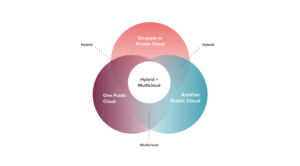Since organizations started adopting cloud computing, there has been an ongoing debate about which cloud deployment model is most suitable.
As the cloud computing industry evolves, most organizations look to a hybrid cloud approach as an optimal solution. However, a new form of hybrid cloud leveraging multiple types of public cloud services has emerged as well — multicloud.
The confusion between the hybrid cloud and multicloud is intensified because they’re frequently used interchangeably. The increasing buzz around the term multicloud prompts the question: Is multicloud just another way of saying hybrid cloud?
The simple answer is that it’s not. Multicloud is a different approach toward cloud computing. This article will share the key similarities and differences between multicloud and hybrid cloud to help you understand which one to choose.
What is Multicloud?
Multicloud is a specific term used to describe operating in multiple different public cloud environments. It must be made up of more than one cloud service from more than one cloud vendor, which can include private cloud service providers in addition to public cloud service providers.
The key difference between multicloud and hybrid cloud is that a hybrid cloud refers to various deployment modes (public, private, or legacy) for the same set of services. Businesses may choose a multicloud strategy for a variety of reasons. Application demands may overwhelm a single provider, while geographic needs require resources in multiple regions. Continuity plans may also require companies to use different clouds to help maintain resiliency.
Similarities between Hybrid Cloud and Multicloud
Hybrid and multicloud are very similar. In fact, every hybrid cloud can be deemed a multicloud, as it comprises more than one cloud. Both the hybrid cloud and multicloud employ a mix of clouds based on the business requirements. They have versatility due to access from multiple clouds and can increase the overall redundancy. In both hybrid cloud and multicloud, data can be shared between clouds, and databases can span clouds. And in either of them, organizations can tailor out the plans based on their budget requirements.
Another similarity between the two cloud environments is the need for multiple tools for management. Since both environments involve several independent cloud environments, organizations will often require a diverse set of tools for operational needs and will eventually be required to make investments in the right set of skills and tools.
Differences between Hybrid Cloud and Multicloud
Every hybrid cloud can be considered a multicloud, as it is made up of more than one cloud. But the reverse is incorrect — it cannot be said that every multicloud is a hybrid cloud. The terms are sometimes used interchangeably, even though they mean slightly different things.
A hybrid cloud always merges private and public clouds, e.g., a private cloud and AWS, while a multicloud always involves two or more public clouds, such as AWS, Azure, and Google.
For example, suppose an organization uses a combination of Azure and AWS cloud or any other public cloud. In that case, it is considered a multicloud infrastructure and not a hybrid cloud environment since there is no private cloud or legacy infrastructure involved.
Tools
In a hybrid cloud, your organization needs security tools and approaches that could simultaneously work across different public and private clouds. In a multicloud, you would require security approaches and tools that could work across multiple public clouds.
While using a hybrid cloud, your team must focus on the native tools for operational tasks. Every cloud provider has its own set of native tools for critical operational tasks like cloud usage monitoring, cost management, and performance analytics. As such, hybrid clouds usually do not require any third-party management tools. On the contrary, using a multicloud, your team is required to learn the tools that could work across all public clouds and translate the operational functions to the native processes of the public cloud. Thus, there is more emphasis on having a single tool that could work across several clouds. Overall, in a multicloud world, your team will spend more time managing service levels, monitoring connectivity across different sites, and navigating through the available toolsets.
Data Control
With a hybrid cloud, you may get an option to keep the critical data within the infrastructure controlled by you, but in the case of multicloud, data must reside on public clouds. Any organization involved in handling financial transactions, medical records, or other sensitive data is bound to comply with certain regulations, such as PCI DSS or HIPAA. A single provider would be considered an additional advantage to minimize the compliance-related risks.
Hybrid Cloud vs. Multicloud: Which one should you use?
A precisely defined cloud strategy is a crucial element for every successful IT department. While planning for cloud adoption or migrating to a new cloud, you must consider the pros and cons of traditional approaches and contemporary practices. Here are some factors to consider:
Cost: Public clouds typically come with less overhead and less direct management than other types of infrastructure. The cloud vendor handles most, if not all, of the responsibilities of maintaining a data center – provisioning servers, applying security updates, and so on. For this reason, businesses for whom cost is the deciding factor may want to move to fully public cloud deployment and perhaps a multicloud deployment.
Security: For businesses with high regulatory standards for any subset of their data or business, a hybrid cloud deployment may be best. With this approach, they can keep some data in a more tightly controlled environment, like a private cloud or on-premises data center. However, these tightly controlled environments are not always more secure. Often, public cloud vendors have more resources for applying patches and protecting data than individual businesses, depending on their cybersecurity budget.
Time and effort for cloud migration: Moving data and business operations entirely to the cloud can be a resource-intensive task (although it is worth the effort). A complete migration into the cloud may not be immediately feasible for some businesses, causing them to adopt a hybrid cloud strategy.
Reliability: Deploying multiple clouds can help keep websites and applications up and running during periods of high user demand. A backup cloud can take on some of the workload if one cloud is overwhelmed.
Vendor lock-in: Using multiple public clouds can reduce dependence on any one cloud vendor. This approach can help boost performance, security, and reliability.
Every cloud infrastructure has its benefits and drawbacks. We would recommend working with a knowledgeable and certified cloud partner to cut out the guesswork and reduce the time it takes to implement the right solutions.
Wizeline takes a vendor-agnostic approach to cloud solutions and provides custom cloud strategies for each of our client’s business and technology needs. We partner with the three industry-leading cloud providers — Amazon Web Services, Google Cloud, and Microsoft Azure — to ensure we have the necessary resources and expertise to make every engagement successful.
To learn more about how Wizeline can help you implement or optimize your hybrid and multicloud strategy, please visit our landing page or contact our team at consulting@wizeline.com.






